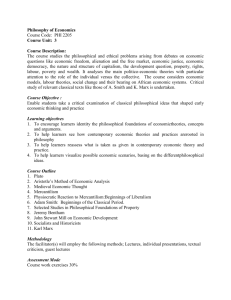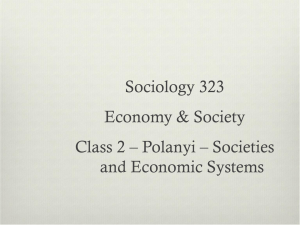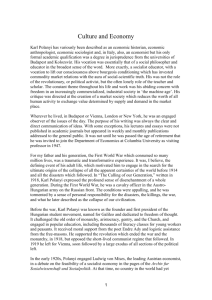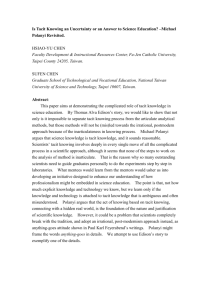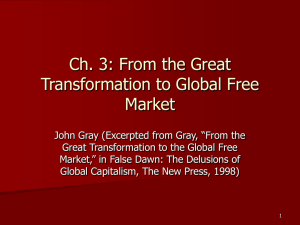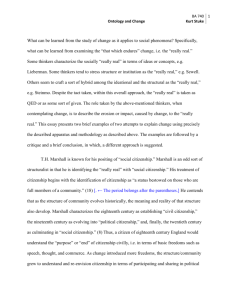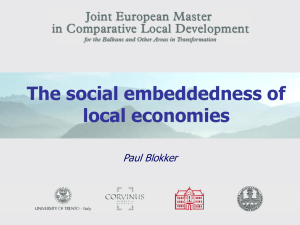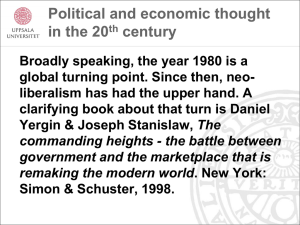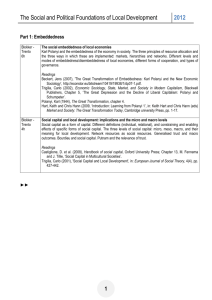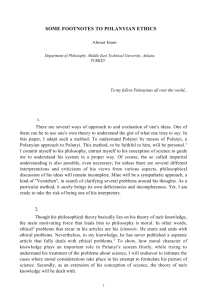Hacettepe Üniversitesi
advertisement
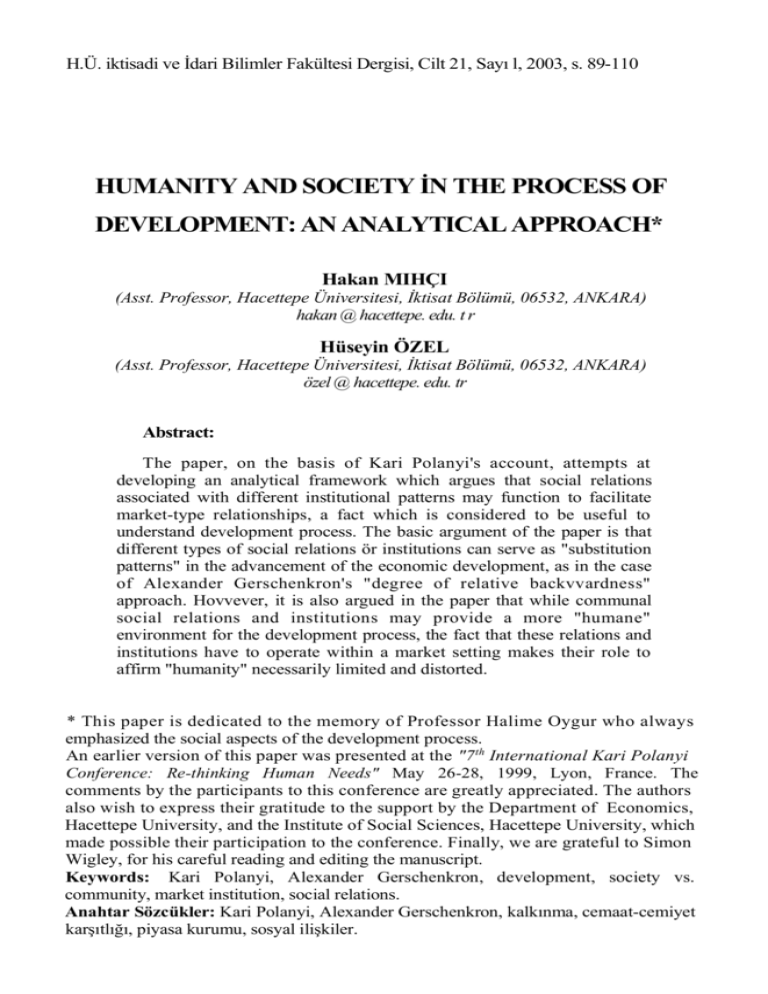
H.Ü. iktisadi ve İdari Bilimler Fakültesi Dergisi, Cilt 21, Sayı l, 2003, s. 89-110 HUMANITY AND SOCIETY İN THE PROCESS OF DEVELOPMENT: AN ANALYTICAL APPROACH* Hakan MIHÇI (Asst. Professor, Hacettepe Üniversitesi, İktisat Bölümü, 06532, ANKARA) hakan @ hacettepe. edu. t r Hüseyin ÖZEL (Asst. Professor, Hacettepe Üniversitesi, İktisat Bölümü, 06532, ANKARA) özel @ hacettepe. edu. tr Abstract: The paper, on the basis of Kari Polanyi's account, attempts at developing an analytical framework which argues that social relations associated with different institutional patterns may function to facilitate market-type relationships, a fact which is considered to be useful to understand development process. The basic argument of the paper is that different types of social relations ör institutions can serve as "substitution patterns" in the advancement of the economic development, as in the case of Alexander Gerschenkron's "degree of relative backvvardness" approach. Hovvever, it is also argued in the paper that while communal social relations and institutions may provide a more "humane" environment for the development process, the fact that these relations and institutions have to operate within a market setting makes their role to affirm "humanity" necessarily limited and distorted. * This paper is dedicated to the memory of Professor Halime Oygur who always emphasized the social aspects of the development process. An earlier version of this paper was presented at the "7th International Kari Polanyi Conference: Re-thinking Human Needs" May 26-28, 1999, Lyon, France. The comments by the participants to this conference are greatly appreciated. The authors also wish to express their gratitude to the support by the Department of Economics, Hacettepe University, and the Institute of Social Sciences, Hacettepe University, which made possible their participation to the conference. Finally, we are grateful to Simon Wigley, for his careful reading and editing the manuscript. Keywords: Kari Polanyi, Alexander Gerschenkron, development, society vs. community, market institution, social relations. Anahtar Sözcükler: Kari Polanyi, Alexander Gerschenkron, kalkınma, cemaat-cemiyet karşıtlığı, piyasa kurumu, sosyal ilişkiler. 90 Hakan MIHÇI, Hüseyin ÖZEL Özet: Kalkınma Sürecinde İnsan ve Toplum: Analitik Bir Yaklaşım Bu yazı, Kari Polanyi'nin görüşlerinden yola çıkarak, "cemaatçi" ilişkiler gibi geleneksel olarak piyasa dışında yer alıyormuş gibi görülen ve farklı kurumsal örüntülerle eşleşen sosyal ilişkilerin aynı zamanda, piyasa tipi ilişkileri sürdürme ve kolaylaştırma işlevini de yerine getirebileceğini ve bu olgunun kalkınma sürecinin anlaşılmasında yararlı olabileceğini ileri sürmektedir. Yazının temel savı, piyasa dışı olarak görülen farklı sosyal ilişki veya kurumların, Alexander Gerschenkron'un "göreli geri kalmışlık derecesi" yaklaşımında olduğu gibi, ekonomik kalkınmanın gerçekleştirilmesinde kullanılabilecek "ikame örüntüleri" işlevini göreceğidir. Bununla birlikte, yazı ayrıca cemaat temelli sosyal ilişki ve kurumların, insanların sosyal varlık olma özelliklerini dikkate aldıklarından, kalkınmanın gerçekleştirilmesinde daha "insancıl" bir ortamın yaratılmasına zemin oluşturabilmelerine karşın, bu ilişki ve kurumların piyasa ortamı içerisinde işlemek zorunda olmaları nedeniyle bunların katkısının ister istemez sınırlı ve bir ölçüde çarpıtılmış olacağını da ileri sürmektedir. "The fascist answer to the recognition of the reality of society is the rejection of the postulat e offreedom. The Christian Discovery of the uniqueness of individual and the oneness of mankind is negated by fascism. Here lies the root of its degenerative bent." (Kari Polanyi, The Great Transformation, p. 258A) INTRODUCTION Daniel Fusfeld (1993: 8), on the basis of Kari Polanyi's analysis in the Great Transformation (Polanyi, 1944), criticizes the Republican conservatives who glorify both the free market and what they cali "family values" in that they cannot see the destructive effect of the free market on the family values. The present paper is an attempt at arguing that such a contradiction may be a "necessary" contradiction, for even in a market society, the so-called "family values" and other social values associated with different institutional patterns such as those resting on the principles of reciprocity and redistribution, to use Polanyi's terms, may become articulated to the market so as to function to reproduce market-type relationships. The present paper tries to develop an analytical framevvork, based on Polanyi's account, that can be used to analyze such articulation processes, H. Ü. İktisadi ve İdari Bilimler Fakültesi Dergisi 91 especially in developing countries even though its applicability is by no means limited to such societies. The argument goes as follows: the institutional separation between the "economic" and the "political" spheres, itself a useful analytical framework in understanding capitalist societies, nevertheless introduces a contradictory element to the working of the market system. For, as Polanyi's notion of the "double movement" demonstrates, the "economic" sphere, the market, must always work against a "social" background, and, for this reason, while the market continuously extends its influence so as to include the "rest" of the society, individuals, who define themselves within the social sphere, try to check this extension, to limit the "dehumanizing" effects of the market relations. That is, social institutions ör some associations that could either be inherited from the past, from the "pre-market phase," ör that could be deliberately formed to counteract the destructive effects of the market relations can function to affîrm both individuality and sociality of human beings, as the two defîning characteristics of them as "species beings." in the fîrst section, Kari Polanyi's analysis which demonstrates the institutional tendencies that exist in a market society and their "dehumanizing effects" are presented by emphasizing the "species" character of human beings. in the second, on the basis of the "societal" framework within which the notion of "double movement" plays an essential role, the possibilities of articulation between different forms of integration around which capital accumulation can be organized are examined in the context of development. 1. THE FICTITIOUS COMMODITIES AND THE DOUBLE MOVEMENT According to Polanyi, the market society, the society which is subordinate to the self-regulating market institution was the result of the creation of the three fictitious commodities, labor, land and money, and its resultant, the institutional separation of the economic from the political sphere. The economic sphere must stand apart from "rest" of the society, its political and governmental system as well as social relations based on blood-ties, social positions, political ör religious considerations ete. Within this self-regulating market, only the two "economic" motives, the hope of gain and the fear of hunger, must govern the behavior of individuals. Since in the market economy the productive apparatus is under the sovereignty of the market, this "disembedded" economic sphere has the effect of making the "rest" of the society dependent upon that sphere. in this market society, not only the social classes are identical with "supply" and "demand" for labor, land and capital, but a whole range of social institutions, from marriage to science, must be at the service of the market, in other words, the market society is an economic society 92 Hakan MIHÇI, Hüseyin ÖZEL in the full sense of the term, whose result is an all-pervasive economic determinism, ör what Polanyi calls the "market mentality." This market mentality, with its twin tenets, namely, the economistic fallacy, i.e., identifîcation of "economic" phenomena with market phenomena (Polanyi et al., 1957: 270; Polanyi, 1977: 20), and the rationality assumption, leads to the dichotomy between the "material" and the "ideal." in this society, ali "economic" behavior is conducted on the basis of the fear of starvation and the hope of profıt, and ali other motives, which are usually considered to be the typical motives affecting everyday lives of human beings, such as honor, pride, solidarity, moral duties and obligations, are regarded as irrelevant to everyday activities and forced to gain a rare and esoteric nature, summed up by the word "ideal," so that "everyday life being handed över to the material, with Sundays reserved for the ideal" (Polanyi, 1947b: 101). From this time onvvards, argues Polanyi, "he who would have refused to imagine that he was acting for gain alone was thus considered not only immoral, but also mad" (Polanyi, 1947a: 114). Yet, it is important to realize that this "dualistic fallacy" (Polanyi, 1947b: 102) is not simply an illusion; it is nothing but the reflection of the existence of a separate and distinct economic system founded on hunger and profit motives. That is to say, this distinction has been institutionalized (Polanyi, 1947a: 115) in the market society. Such an institutionalization, on the other hand, was a result of the creation of the fictitious commodities, which are not actually produced to be sold and bought in the market even though their treatment as commodities were necessary for the market system to function (Polanyi, 1944: 72-73). What the creation of these "commodities" actually characterizes is a "dehumanization" process arising from the "commodification" of both human life activity and its natural environment (Özel 1997). First of ali, since according to Polanyi what öne calls "labor" is only another name for the whole human activity which cannot be separated from life, to put this activity under the rule of the market, by making it subject to the fear of hunger, will mean no less than the breakdown of the "totality" of life itself. As is mentioned above, this life activity is now separated between the "ideal" and the "material"; human life activity is now broken down into specific compartments, such as economic, political, religious, ete., and only the "economic" motives, the fear of hunger and hope of gain, are allowed to govern individuals' lives. in other words, the human life activity itself becomes "commodifıed." However, what is in effect being reduced to the commodity status is not really this activity, namely, labor, itself, but man's abilities which he uses in engaging this life activity, namely, labor power (Polanyi, 1947b: 98; Polanyi, 1944: 176, 162). This in turn means the separation of man not only from his own life activity, but also, even more importantly, from his own "agency," the power that characterizes human beings, with the •« • • H. Ü. iktisadi ve idari Bilimler Fakültesi Dergisi 93 detrimental consequence that "in disposing of a man's labor power the system would, incidentally, dispose of the physical, psychological, and moral entity 'man' attached to that tag" (Polanyi, 1944: 73). The most immediate effect of this commodifîcation of labor power, according to Polanyi, is actually the dissolution of the society into "atoms," each of which only behaves in accordance with the profit motive and the fear of starvation, irrespective of the other members of the society. This, on the other hand, requires the annihilation of the older, organic forms of existence so that a new, an atomistic and individualistic organization could be founded on the principle of freedom of contract. This, in practice, requires that "noncontractual organization of kinship, neighborhood, profession, and creed were to be liquidated since they claimed the allegiance of the individual and thus restrained his freedom" (Polanyi, 1944: 163). Since the labor contract is the manifestation of "freedom" from the social bonds which actually protect human beings from destruction, for it is the presence of these bonds which makes the threat of starvation in the "primitive" societies nonexistent (Polanyi, 1944: 46; 163-64), the destruction of these institutions and bonds of society makes the threat of hunger to be an individual phenomenon forcing human beings to seli their labor power in the market. This process of disintegration of the society is also a process of the separation of human life activity from the natural setting within which it takes place; that is to say, within this process land also is reduced to a commodity. For Polanyi, what öne calls land cannot be characterized merely by its economic function; "it invests man's life with stability; it is the site of his habitation; it is a condition of his physical safety; it is the landscape and the seasons. We might as well imagine his being born without hands and feet as carrying on his life without land" (Polanyi, 1944: 178). Therefore, for Polanyi, these two joint steps, commodification of labor and land, characterize the fact that under the market system human beings are forced to live through a "perverse" life within which they are deprived of the very qualities that make them human ör, to use Abraham Rotstein's (1990: 100) metaphor, the market system represents the artificial, externalized embodiment of the individual ör the "blind and dark alter ego." The institutional structure of capitalism forces human beings to live through a separate, fragmented life; in other words, under capitalism the "totality" of human existence breaks down in the form of the breakdown both of the totality of human life activity into "economic" and "noneconomic" spheres and of the unity between man and his own powers which he exerts within this life activity, whereas the commodification of land leads to the breakdown of the unity of man with nature. 94 Hakan MlHÇl, Hüseyin ÖZEL To put it another way, this is nothing but the violation of the very sociality of human beings. The market mechanism transformed the very substance of human economy, by transforming "man's ultimate dependence on nature and his fellows for the means of his survival" for it put this dependence under the rule of the market (Polanyi, 1977: 8), which atomizes the individual. in other words, the disembedded market economy makes the rule of the "changelessness of man as a social being" (Polanyi, 1944: 46) obsolete for it inevitably leads to the dissolution of the society by forcing man to behave like a homo economicus. As can be seen from this brief discussion, Polanyi's arguments depend critically upon the general, transhistorical aspects of the human condition, as Polanyi emphasized continuously (cf. Polanyi, 1944: 258A; Mendell, 1989: 477). it is easy to understand why it must be so; in order to talk about the "dehumanizing" aspect of capitalism, öne should have a conception about the human condition; otherwise Polanyi's whole critique of capitalism does not make any sense, for if what we cali human nature depends exclusively upon the social context, then it is not very difficult to defend capitalism on the basis of human nature. For Polanyi, however, capitalism is a "tvvisted" ör a "perverted" existence for the humanity as a whole because it reduces both human beings themselves and their natural environments into commodities, a quite contrary fact to their "defînitions." Such a contradiction between the essence and the existence of human beings, stems from the fact that under the market system, both the individuality and the sociality of human beings ör to use Polanyi's own expression, both "the uniqueness of individual and the oneness of mankind" are negated. Such a notion implies that Polanyi regards human beings as "species-beings," to use Marx's term, in his 1844 Manuscripîs, which denotes for the "essence" of man (Marx, 1975; Hunt, 1986). According to Marx, man is a species-being in two senses, though these two senses are in effect identical: a person is a speciesbeing, first, "because of the nature of human perceptual and conceptual faculties and human life-activity," and, second, "because of the social nature of human activity" (Hunt, 1986: 97,98). That is, a person is a unity of individuality and sociality, ör more appropriately, the individual is the social being; even his very existence is social activity: "/ am stili socially active because l am active as a man. it is not only the material ofmy activity ... which l receive as a social product. My own existence is social activity. Therefore what l create from myself l create for society, conscious of myself as a social being" (Marx, 1975: 350). • • • • H. Ü. iktisadi ve idari Bilimler Fakültesi Dergisi 95 Such a notion of human essence, which is based on the importance of human potentialities that are to be realized and flourished in interaction with other individuals is also the prevalent theme guiding Polanyi's entire work. For Polanyi too, the individual is a communal being by nature: "... the discovery of the individual is the discovery of mankind. The discovery of the individual soul is the discovery of community. The discovery of equality is the discovery of society. Each is implied in the other. The discovery of the person is the discovery that society is the relationship of person (Polanyi, 1935: 370). The market system, however, causes to the breaking down of the unity between these two characteristics, individuality and sociality. From a social theoretical point of view, the most immediate effect of the creation of the commodity fıctions is the atomization of the individual: individual, through her being reduced to the "bearer" of labor power, becomes just a "cog," ör a functional unit whose only function is to reproduce market-type, exchange relations. This "reifıcation" which is also reinforced by the mechanization and "rationalization" of production process reducing individuals into mere "appendage" of capital, even increasingly dominates their consciousness. The result of this process is the emergence of the "reifıed mind," which sees commodity form and its "laws" as natural and eternal (Lukâcs, 1971: 93-98); that is, the abstraction of the "rational economic man," Homo Oeconomicus, becomes a reality; individual transforms into a functioning component of a system, and therefore as such must be equipped with essential features indispensable for running the system (Kosik, 1976: 52). The immediate corollary of this atomization is, of course, the "market mentality" with its postulate, the notion of economic "rationality": Önce a human being is reduced to an "individual in the market" (Polanyi, 1977: 29), i.e., to Homo Oeconomicus, it was now easy to argue that "economic" action "was 'natural' to man and was, therefore, self-explanatory" (Polanyi, 1977: 14). That is to say, from now on, the term "economic" could safely be identified with the market activity. Neveıtheless, by their very nature, human beings do not consider themselves as mere "atoms" but, as real human beings who constantly try to realize their potentialities in a social setting. Real individuals as; neighbors, professional persons, consumers, pedestrians, commuters, sportsmen, hikers, gardeners, patients, mothers, ör lovers— ... are accordingly capable of representation by almost any type of territorial ör functional association such as churches, townships, fraternal lodges, clubs, trade unions, ör, most commonly, political parties based on broad principles of adherence (Polanyi, 1944: 154). 96 Hakan MIHÇI, Hüseyin ÖZEL The result of this contradiction between human beings' recognition of themselves as social beings on the öne hand and the values of the market forcing them to behave as economic units is, of course, the double movement. Polanyi argues that since the creation of commodity fîctions and its result, subordination of the society to the market, is in contradiction with the human essence, it is quite natural for people to protect the social fabric against the market, for otherwise it will disintegrate. As has been argued, continuous extension of market relations into every aspects of human existence, so as to include the three fictitious commodities, namely, labor, land, and money, means no less than the commodification of life itself, for what these fictions together represent is the totality of human essence. However, this commodification could not take place without the "self-protection" of the society against the danger of being "annihilated" by the market, in the form of social interventions into the individual markets for these three "commodities." in other words, the market society is characterized by a "double movement" which has been at workfrom the very start: "the extension of the market organization in respect to genuine commodities was accompanied by its restriction in respect to fictitious ones" (Polanyi, 1944: 76). These two simultaneous tendencies, the process of commodification on the öne hand, and society's "response," i.e., the resistance carried out by different classes and organizations within the society to the extension of the market on the other, give the capitalist society its unstable character: the protective countermovement as an attempt at restricting ör at least slowing down the extension of the market will eventually impair the working of the selfregulating market. Since the system is organized on the basis of these commodity fictions, any intervention from the part of the social classes ör the state, ör both, into the markets, creates impairments in these three markets. These impairments will in turn intensify the tensions already inherent in the society which will obstruct the working of the market as a whole. That is to say, the double movement actually signifies a circular process: since the social classes themselves and their conflicts emanate from the economic sphere in a capitalist society and since this society is subordinate to the market, conflicts between these classes will necessarily have social dimensions even when they are purely economic in character, and this in tüm will cause further disruptive effects on the economic sphere whose impairment will intensify the tensions existing in the society (Polanyi, 1944: 201). in other words, since the protectionist countermovement is a direct intervention to the working of the self-regulating market, which inevitably has political consequences, the process of double movement will tend to break the institutional separation of the economic from the political upon which the market system is built. The result of such a process would be the disintegration • • • • H. Ü. iktisadi ve idari Bilimler Fakültesi Dergisi 97 of the society, for the attempt to reestablish this institutional separation requires eradication of every form of social opposition against the market by any means, including the use of overt force as the fascist period has shown. The process of the double movement should be conceived at two distinct yet related levels: the class level, for the social classes, above ali the working class, have been the causal agents who actually carried out the protective countermovement, and the institutional level, for the protectionist countermovement created strains in the institutional structure of the market system, which eventually led to the catastrophe (Polanyi, 1944: 134). At the institutional level, the sources of the disruptive strains that had arisen in the organization of the market system were the institutional separation of the economic sphere from the political öne, and the conflict between the international and the national spheres within the system. On the öne hand, although the system required this institutional separation between the economic and the political spheres, the tensions between social classes created in the market sphere sooner ör later had to be transferred to the political sphere, which in turn produced further problems in the market. On the other hand, the fact that the functioning of the system required the gold Standard and the balance of power at the international level, both of which demand that the domestic economy and politics must be at their service, were in conflict with popular and nationalist considerations emphasizing the sovereignty of the nation-states, which played a significant role in the domestic sphere from the very beginning of the market society. Nevertheless, the double movement should be reduced neither to a simple form of class struggle, nor to state interventions with the implication that state is the embodiment of the protectionist countemıovement, as it is sometimes thought. The double movement can be understood as a conception of "the selforganization of the society, sometimes with the help of the government and sometimes in spite of it, to protect people and land against the disintegrating forces of the market system" (Baum, 1996: 10, 55). That is to say, the double movement, seen from a "societal" perspective, refers to the struggle between those forces that represent the "disembedded" economy and those that represent the attempt to "reembed" it into the society, as the spontaneous rebelling of individuals against the contradiction between their essences and existences, with the aim that "the human society will be real, for it will be humane: a relationship of persons" (Polanyi, 1935: 375). Since, as we have argued, the extension of the market, the commodification process, violates the "human" aspect of human existence, it should not be surprising that human beings in the society have to resist this violation irrespective of their class origin, which explains the breadth of the protectionist countermovement. However, the contradiction betvveen these two "collective alter-egos" (Rotstein, 1990: 99) that 98 Hakan MIHÇl, Hüseyin ÖZEL characterizes the development of the market society until the 1930s as demonstrated in The Great Transformation, is by no means limited to the "liberal" phase of the market society; it is stili prevalent, we argue, in our contemporary world, about which Polanyi's "societal" perspective has much to offer. 2. THE SOCİETAL PERSPECTİVE AND THE CONTRADICTIONS OF THE MARKET SOCİETY Among the critics of Polanyi's work, considered in its entirety, two of them seem particularly interesting for our purposes. The first of these critics is the historian Eric Hobsbawm (1994) who, in a recent work on the twentieth century, asserts that "Polanyi exaggerated the logic of capitalism" by emphasizing economic motives. According to Hobsbawm, "capitalism had succeeded because it was not just capitalist. Profit maximization and accumulation were necessary conditions for its success but not sufficient ones. it was the cultural revolution of the last third of the century which began to erode the inherited historical assets of capitalism and to demonstrate the difficulties of operating without them " (1994: 343). The second critic is Douglas North (1977), as the leading figüre of the "new" institutionalist perspective which takes the rational choice theory as a starting point in examining institutions, criticizes especially Polanyi's later work (e.g., Polanyi et al. 1957; Polanyi 1977) emphasizing different forms of integration, namely reciprocity, redistribution and market patterns. According to North, reciprocity and redistribution "are everyvvhere characteristic today as in the past in resource allocation within households, voluntary organizations, and in government" (North, 1977: 709), and thus nonmarket allocation of resources was and stili is a majör aspect of economic organization. The reason for this is that the existence of transaction costs associated with defining property rights and hence with the development of markets can give rise to these kinds of nonmarket allocations (North, 1977: 710). Therefore, to the extent that these transaction costs are high compared to benefıts, nonmarket allocations will be used within the organization of the economy, in a way quite consistent with the rational choice theory, as is emphasized by the "new" institutionalist perspective (e.g., Nabli and Nugent, 1989; Langlois, 1986; Olson, 1982; Nugent, 1989). Both of these criticisms, it appears to us, are the result of a failure to recognize the full breadth of Polanyi's "societal" framework (see Dalton 1968). That capitalism needs those forms of integration and the associated social and H. Ü. İktisadi ve İdari Bilimler Fakültesi Dergisi 99 cultural values with them to operate does not itself constitute a critique of Polanyi, for the notion of the double movement, also embraces this tendency; that is, although only öne of these three forms of integration is dominant in a particular society, the remaining two can live and assert themselves even to the extent that they can be incorporated by the dominant form. The proposition that the society in the market system is subordinate to the disembedded market does not necessarily imply that market type behavior and other behavioral patterns presupposing other forms of integration exclude each other. What such a proposition implies at best is that there is a contradiction, seen from the perspective of the production and reproduction of the market society, between different functions of the very same institution, be it family, state ör even religion. These institutions, at the same time, both carry the conditions of the reproduction of the market system and, as "expressions" of human nature, affirm humanity of individuals and therefore also function to resist the very market relations. Since social institutions are in part, in Polanyi's words, "embodiments of human meaning and purpose" (Polanyi, 1944: 254), to be characterized by the species-nature of individuals, it is quite normal for these institutions to reflect those traits; but at the same time, since the capitalist reality is "upside down," to borrow a metaphor from Marx referring to the fact that a human being is forced to behave as a Homo Oeconomicus, it negates the very freedom which is expressed in these institutions (Macmurray, 1935). As is well known, the main thrust of Polanyi's "substantivist" approach is the proposition that "man's economy, as a rule, is submerged in his social relationships" (Polanyi, 1944: 46; Polanyi, 1947b: 98), and this proposition is valid even in a market society. Although the market system is an attempt at the organization of the society along the institutional separation between the "economic" and the "political," the existence of the double movement operating at the societal level makes the system as a "stark utopia" (Polanyi, 1944: 3) because it tends to break this institutional separation. The reason for this is the fact that individuals, as "species-beings," refuse to define their identities, and to act, only on the basis of the hope of gain and the fear of hunger. For Polanyi, human beings are "humanized" by the plurality of institutions, like church, family, work, through \vhich they can both express their essence and acquire an identity based on those "human" traits (Glasman, 1994: 70). Since social institutions are embodiments of the human essence, even in a capitalist society, those institutions that are not exclusively characterized by "economic" factors can function for individuals to affirm their connectedness with other individuals through having personal, direct relationships. in other words, these institutions, together with deliberately created associations ör communities, aggregates, ete. (including political parties and trade unions), can function as "safe havens" to escape from the destructive effects of the market 100 Hakan MIHÇI, Hüseyin ÖZEL system. Although this is for the most part an individual act, it nevertheless presupposes some form of collectivity, for the function of these institutions are to affirm sociality, direct, personal relationships. To the extent that these institutional structures, such as the working class organizations, have the power to transcend the economic-political separation, they can be successful in counteracting to the destructive effects of the extension of the market. Nevertheless, because of the reification process which even dominates the mode of thinking in a capitalist society, i.e., because of the "market mentality," it is not very easy, if not impossible, to distinguish between the two conflicting tendencies in the double movement, i.e., extension of the market and resistance to it. The reason for this is that even the very human properties can be so distorted in discourse, through the reproduction of capitalist "ideology," that they can be functional in the reproduction of market relations, in which case even a humane act such as the affırmation of social connectedness could become a vehicle in the reproduction of the market system. in other vvords, in a capitalist society, human beings are reduced to mere means for each other, even within the boundaries of a closely-knitted community. For this reason, especially in the contemporary society, the protective movement seems to have been undermined to the extent that reification dominates every sphere of life, including the mode of thinking of the "modern" individual. That is, the protective countermovement seems paralyzed to the extent that it is "suppressed by the power of International capital on the öne hand and inhibited by the incapacity of increasingly divided, fragmented, and individualized societies to organize themselves to act in the interests of society as a whole" (Bienefeld, 1991: 26). Therefore, to the extent that individuals' minds are reified enough to sustain capitalist relations, social institutions themselves would become vehicles of reproducing capitalist relations. Then the very same institution, whether it is the state, family, church, ör even the trade union, will both convey the conditions of the reproduction of capitalist social relations and be an embodiment of the resistance, even in an unconscious way, to these relations, for they provide the opportunity to affirm sociality. Then it should be no surprise that although these institutions ör associations are in part reflections of the conditions of sociality, they are at the same time bases of the very same social relations that destroys those conditions. As an example to an important contradiction in this regard, öne can recall Polanyi's proposition that the "discovery" of society is achieved with the market society, ör, using Ferdinand Tönnies's influential distinction, with the transition from the "community" (Gemeinschaff) to the "society" (Gesellschaft). Although the market has the effect of dissolving the social bond, it is also true that the individual becomes more and more dependent on other human beings at the same time because of the increasing social character of production. in other words, "the knowledge of society," as Polanyi argued, "came to us through H. Ü. İktisadi ve İdari Bilimler Fakültesi Dergisi 101 living in an industrial society" and it is "the constitutive element in modern man's consciousness" (Polanyi, 1944: 258A). That is, in the market society, there is a contradiction between the "discovery of society" and the atomization of the individual. Tönnies's framevvork, which was a primary source for Polanyi's approach, is quite useful to analyze the market society. For Tönnies, there is a sharp distinction betvveen "community" (Gemeinschaff) and "society" (Geselhchafi): Gemeinschaft, whose purest form prevails within the family, characterized by the unity of individuals whereas Gesellschaft is characterized by the separation between them (Tönnies, 1988: 64-65). On the other hand, regarding minds of individuals living in these two forms of human aggregates, closely associated with this distinction is another öne between "natural will" (Wesenwille), which carries the conditions of Gemeinschaft, and "rational will" (Künville), which develops Gesellschaft. Natural will (ör sometimes translated as "integral will"), as the natural disposition of human beings, is characterized by the spontaneous expression of their drives and desires, whereas "rational will," which does not have the spontaneity and impulsiveness of the natural will, basically expresses rational calculation (Tönnies, 1988: 103-105). in other words, rational will, as the very name suggests, reflects the will of the self-interested individual, ör the homo oeconomicus who tries to reach his/her end by employing available means. Here the significance of rational will is that it divorces means and ends, both in personal relations and at work. it even makes human beings as means for each other, thereby contradicting Kant's famous maxim. • it appears that there are two significant characteristics of Gesellschaft, ör the market society proper: First, as the result of the development of the "rational," self-interested individual, who is nothing but an atom in the society and for whom other individuals appear as paıticular ends, the bonds between human beings are supplanted by useful associations, formed by particularized individuals. Second, maybe even more important than the first öne, is that the very category of the individual in the modern sense appears with Gesellschaft. A person in Gemeinschaft belongs to a whole, which makes his/her life meaningful, ör in Marx's words, "the individual has as little torn himself free from the umbilical cord of his tribe ör community as a bee has from his hive" (Marx, 1976: 452). Such a community is characterized, as we can see in Erich Fromm's description of the Medieval society (1941: 40-41), by the sense of security, solidarity, the subordination of economic to human needs, the directness and concreteness of human relations. Though the individual is not alone and isolated, this community is also characterized by the lack of individual freedom. in other words, in such communities, individuals are not 102 Hakan MIHÇl, Hüseyin ÖZEL "species-being" in the real sense, for their very individuality is denied. On the other hand, in Gesellschaft, individual freedom and individuality seem to become dominant. According to Tönnies, the transition to Gesellschaft implies "a dissolution of ali those ties which bind the individual through his natural will and apart from his rational will. For these ties restrict his personal freedom of movement, the saleableness of his property, the change of his attitudes, and their adaptation to the fındings of science" (1988: 234). Hence, despite its destructive effects upon the social connectedness in a Gemeinschaftlike society, capitalism also creates the preconditions of "free" human beings, ör the possibility of realizing their own potentialities. What makes this possible is actually the development of the industry, with the increasing social character of production, which came with the "machine age" (Polanyi, 1977: xlviii). At the same time, social production, through cooperation and also exchange, though strips humans of their individuality, also develops their species-consciousness. in other words, through making the individual realize her dependence on other individuals, that process makes her be aware of the "reality of society." Then, the market society represents both the "discovery" and the "denial of the reality" of the society. Such a framework emphasizing the contradictory character of the reproduction of the market society suggests that since individuals are also communal beings, it is natural for them to carry this trait to the sphere of the market, even to the extent that market needs these traits to reproduce itself. That is to say, some institutional patterns, such as reciprocity and redistribution, and their associated values, which are supposed to be the relics of the obsolete "Gemeinschaft," stili exist and enter into both production and the reproduction of the market.1 Even though the market pattern is stili the dominant öne, other forms of integration can be articulated to this pattern, and thus creating new "opportunity structures" (Block and Summers, 1984: 74-75), on a smaller scale, for individuals to achieve some strategic positions within the market through their communal identities and relationships forming various social networks. Although the recognition of such a possibility of the existence of different forms of integration and their associated value systems, living side by side and reinforcing each other actually dates back to Max Weber (Weber, 1930): it is surprising to observe that only a lip service has been paid to this possibility within the development literatüre, only in the form of the famous distinction between the "traditional" and the "modern" sectors in a developing country. Besides the fact that such a dualistic approach does not allow a dynamic interaction, let alone articulation, between these two sectors, it also sees the existence of the traditional sector as the main obstacle to development. Hence, the emphasis in this literatüre is given to the displacement of the traditional H. Ü. iktisadi ve İdari Bilimler Fakültesi Dergisi 103 sector by the modern sector. The displacement of the institutional structure of the traditional sector with that of an imported modern sector, however, is believed to result in social disorganization (Grabowski and Shields, 1996: 115). According to this approach, vvhereas the modern, capitalist, sector, based on the principle of exchange by two equal, self-interested parties, is the principle driving force of capital accumulation, the existence of traditional, Gemeinschaft-type, unequal, non-contractual relations between individuals acting upon communal traits, poses an important obstacle for the modernization and hence for the development, to be conceived as a "modernization" project aiming at a society-wide transformation. Contrary to the almost axiomatic assumption that the modernization is the "magic key" for the transformation and the development process of the developing societies, our focus is on the "traditional" sector. More specifically, we argue that the "traditional social relations" could be used as a tool for the extension of the market relations and the accumulation of capital. To evaluate our argument, a reference can be made to Alexander Gerschenkron's "degree of relative backwardness" approach. Gerschenkron's approach to development in an historical setting primarily deals with the degree of backwardness, and it can be said that the emphasis is given upon the beginnings of capital accumulation rather than its long term objectives. Gerschenkron's hypothesis is that the initial spurt of industrialization experienced by a number of European countries in the eighteenth and nineteenth century was systematically related to their "degree of relative backwardness" (relative to the country ör countries that had already experienced an industrialization) (Gerschenkron, 1966: 359; Supple, 1963: 40; Sandberg, 1982: 675). Economic development and the "modernization" of the limited number of European countries (especially Britain) in the nineteenth century which increased the relative backwardness of the rest of the European countries, created a sharp controversy between "actual" and "potential" economic conditions in the backward countries. Gerschenkron describes this situation as an increased "tension" between "reality" and "possibility." The degree of economic backwardness is positively related with the ensuing tension which could be released in the form of an industrial spurt. The industrial spurt reveals itself as an upward discontinuity in the backward country's accumulation of capital. (Gerschenkron, 1966: 8). More simply, it can be said that Gerschenkron's approach is designed to "leap" out of backwardness (Trebilcock, 1981: 9). it should also be mentioned that in the process of capital accumulation, backward countries have been obliged to use social and institutional factors which could not be easily associated ör coincided with those of the already developed countries. 104 Hakan MIHÇ1, Hüseyin ÖZEL Gerschenkron's approach heavily depends on two interrelated concepts, namely "the advantages of backwardness," and "the substitutability of preconditions." Contrary to its antecedent, nothing as sophisticated as the Rostowian preconditions are postulated in Gerschenkron's approach. True, certain preconditions of the industrial growth and the capital accumulation are missing in the backward countries which prevent their economic development. But, should this situation lead to long periods of preparation with respect to capital accumulation in the case of backward countries? Again, should this period be a mere replication of the developed countries' experience? Gerschenkron's reply to both of these questions is negative. According to Gerschenkron (1966: 33), it is not necessary to draw a "seperation line" between the preparation and the rapid development periods. Nevertheless, the recognition of relative backwardness, forces the country to foster development process by making innovative substitutions for missing preconditions. The greater the degree of relative backwardness, the greater will be the number of missing preconditions and, therefore, more resourceful for the country to find innovative substitutions. in other words, certain types of social relations and institutions can be used as "substitution patterns" in the advancement of the material wealth. The general assumption of the approach can simply be stated as: the greater a country's backwardness, the more rapid will be its economic development. A number of hypotheses are suggested, however, to deal with more specifıc aspects of the development process.2 Among these hypotheses, the most crucial for our concern is the following öne: The greater a country's relative backwardness, the greater will be the role of special institutional factors designed to speed development (Gerschenkron, 1966: 353-354; Barsby, 1969: 449; Gregory, 1974: 656). in analyzing the development process of the backward countries, Gerschenkron also argues that the greater a country's relative backwardness, the greater will be the role of the state in the development process. Thus, the role played by the state will diminish if the country's relative backvvardness is tolerable (Gerschenkron, 1966: 41, 354, 358). Hovvever, the state cannot be solely taken as an "intervention apparatus," in the Keynesian sense, for the functioning of the market forces. By its very nature, in the Gerschenkron's analytical framework, the state can also be considered as a "synthesis" of ali the complex, "indigenous" social relations of each particular society. it is most probably because of that fact that Gerschenkron attempts to formulate "substitution patterns." and hence the "advantages of being a late comer." • • • • H. Ü. iktisadi ve idari Bilimler Fakültesi Dergisi 105 Looking from this perspective, communal relations in the form of solidarity, face to face contact among individuals, religious and cultural peculiarities, close family ties and ali other types of connectedness which reflect the "sui generis" characteristics of each society, may allow individuals ör particular organizations to achieve some strategic positions within the market, and hence within the capital accumulation process. in this respect, the state can play an "intermediary" role for the accumulation of capital by facilitating the process itself. As the articulation mechanism starts to work properly, it becomes increasingly difficult to distinguish the activities of the state from those of the particular interest groups formed by using communal relations. Furthermore, these interest groups may even "compensate," rather than substitute, the role of the state in the capital accumulation process, and hence give an impetus to the advancement of economic development. Turning back to the discussion of the duality between the "traditional" and "modern" sector, this discussion might be resolved to some extent by arguing that the "real" duality lies in the role of the state in a capitalist society. While the state has to promote market relations to foster capital accumulation, it also claims to represent the whole of the society, and thus it functions to protect the "interest" of the society as a whole, mainly through its redistributive role. For this reason, different communal groups representing different interests should try to affect the working of this institutional structure, which makes the state as an "arena" within which the conflicts between different social groups needs to be resolved according to the relative strength of each group. But to the extent that the redistributive role of the state also gives an advantageous position to a specific group in its struggle to actively participate to the accumulation process, state policies directed to promote economic development also represent the interests of specific "communities." Such an articulation between the "modern" and the "traditional" sectors, at the societal level, especially through the formation of the state policies, we believe, should also be taken into account in evaluating the development process/1 o At this point, it might seem that the formation of different communities and the emphasis on the importance of communal relations can provide a solution to both the problem of development, for it allows to create a more "humane" setting for development, and to the problem of the necessity to counteract the dehumanizing tendencies of the market. However, such a "solution," which only emphasizes sociality ör connectedness, as in the rhetoric of the return to the "lost community," is not only impossible, for it is only as viable as the attempt "to elevate primitism to a morality and seek shelter from the machine age in the Neolithic cave" (Polanyi, 1977: xlvii), given the 106 Hakan MIHÇI, Hüseyin ÖZEL irreversibility of technological progress, but dangerous as exemplified by the fascist period, within which a heavy emphasis on the "lost community" was so prevalent, itself has shown. For what such a "solution" amounts to is the violation of both "the uniqueness of individual and the oneness of mankind," the two inseparable characteristics of "species-beings." Although "community" affirms connectedness because of the directness of human relations, it cannot yet embrace the humanity in its "species" sense for two reasons. First of ali, since the social relationships defining a "community" are hierarchical and very strict, there remains so little a room for human individuality and difference that a person cannot realize her potential through a unique way. Even more important than this is that a person defining her identity on the basis of a community cannot recognize her being a member of the "human species." The reason for this is given by Polanyi himself: "Of ali the basic principles governing the development of early economic institutions, the need for the maintenance of communal solidarity deserves pride of place. Domestic and foreign relations are in stark contrast: solidarity here, enmity there, rule the doy. "They" are the objects ofhostility, degradation, and enslavement, "we" belong together and our communal life is governed by the principles of reciprocity, redistribution, and the exchange of equivalents" (Polanyi, 1977: 59). To conclude, then, any solution to the problems created by the market system, this "stark utopia," must consider the necessity of the development of "species-consciousness." in this regard, Polanyi seems to endorse Tönnies's own solution: a society, yet to come in the distant future, which integrates the characteristics of Gemeinschaft and Gesellschaft, ör "the person in community" (Rotsein, 1990: 104). it is only within such a society in which human beings can affirm both their individuality and their connectedness to the whole of the humanity, thereby enabling the flourishing of their species nature, that the problem of "freedom in a complex society," which occupies a prominent place in Polanyi's overall account, be resolved. CONCLUSION This paper, on the basis of Polanyi's notion of the double movement, considers the impairment and the advancement of the market relations at the same time by focusing on the context of economic development. Unlike the extensive mainstream development literatüre which emphasizes the incompatibility of the "modern" sector with the "traditional" sector, the emphasis of this paper is on the function that the so-called "traditional" ör • • • • H. Ü. iktisadi ve idari Bilimler Fakültesi Dergisi 107 "commımal" social relations in the form of solidarity, face to face contact among individuals ete., serves to advance the market relations and the accumulation of capital, by allowing individuals to achieve some strategic positions within the market. The paper argues that these traditional social relations and institutions inherited from the pre-capitalist formations may be so well articulated to the "modern" sector that they become essential to advance capitalist relations themselves. in other words, such social relations and institutions can serve as "substitution patterns" in the advancement of the economic development, as in the case of Gerschenkron's "degree of relative backvvardness" approach. That is to say, if capitalist relations and the selfregulating market with its necessary institutions were not developed enough to be a driving force in the development process, traditional relations emphasizing collective action of individuals to achieve some strategic positions in the market sphere may serve as substitutes for capitalist processes as shown in the paper. The advantage of these traditional relations and institutions would create lies in the affırmation of sociality, another important characteristic of human beings together with their being individuals aiming utility and/or profit maximization. That is, in such an environment human being pursue their individual aims within a communal setting. Nevertheless, it is also argued in the paper that while communal social relations and institutions may provide a more "humane" environment for the development process, for they serve to the affirmation of sociality and individuality at the same time, the increasing dominance of the "market mentality" causes the contradictions of the market society to exist and assert themselves. For such attempts will necessarily result in falling short of the recognition of the "species" character of human beings; that is, both "the uniqueness of individual and the oneness of mankind." NOTES 1 See Buğra (1998) for an analysis of the role played by the social relations based on the principle of reciprocity in the process of creating a market for Turkish firm producing consumer durables. 2 in the development and the economic history literatüre, there have been several attempts to test quantitatively some hypotheses about Gerschenkron's relative backwardness approach in a variety of countries. These studies have been thoroughly surveyed and evaluated by Mıhcı (1998: 567-572). The specifıc forms of articulation in specific societies, however, is an empirical matter which lies out of the scope of this paper. But stili, the communal relations within extended families, some religious communities, and smaller "gang" formations using illegitimate methods seem among the possible candidates. in this respect, based on the recent experience in Turkey, the controversy around what has come to be called the "Islamic capital" and the influence of the "gang" connections on both accumulation and state actions seem to be worth considering as interesting cases. 108 Hakan MIHÇI, Hüseyin ÖZEL REFERENCES Barsby, S. (1969), "Economic Backwardness and the Characteristics of Development", Journal o/European Economic History, 29: 449-467. Baum, G. (1996), Kari Polanyi on Ethics and Economics, Montreal: McGill-Queen's University Press. Bienefeld, M. (1991), "Kari Polanyi and the Contradictions of the 1980s", M. Mendell and D. Salee (eds.), The Legacy of Kari Polanyi: Market, State and Society at the End of the Twentieth Century içinde, New York: St. Martin's Press: 3-28. Block, F. and M. R. Somers (1984), "Beyond the Economistic Fallacy: The Holistic Social Science of Kari Polanyi", in T. Skocpol (ed.), Vision and Method in Historical Sociology içinde, New York: Cambridge University Press: 47-84. Buğra, A. (1998), "Non-Market Mechanisms of Market Formation: The Development of the Consumer Durables Industry in Turkey", New Perspectives on Turkey, 19: 1-28. Dalton, G. (ed.) (1968), Primitive, Archaic, and Modern Economies: Essays of Kari Polanyi, New York: Anchor Books. Fromm, E. (1941), Escape From Freedom, New York: Owl Books. Fusfeld, D. R. (1993), 'The Market in Society", Monthly Review, 45 (1): 1-8; reprinted in K. McRobbie (ed.), Humanity, Society and Commitment: On Kari Polanyi, Montreal: Black Rose Books, 1994: 1-6. Gerschenkron, A. (1966), Economic Backwardness in Historical Perspective, Mass.: The Belknap Press of Harvard University Press. Glasman, M. (1994), "The Great Deformation: Polanyi, Poland and the Terrors of Planned Spontaneity", New Left Review, 205: 59-87. Grabowski, R. and M. P. Shields, (1996), Development Economics, Cambridge, Mass.: Blacksvell Publishers, Inc. Gregory, P. R. (1974), "Some Empirical Comments of The Relative Backwardness Hypothesis: The Russian Case", Economic Development and Cultural Change, 22: 654-665. Hobsbav/m, E. (1994), The Age of Extremes: A History of the World, 1914-1991, New York: Vintage Books. Hunt, E. K. (1986), "Philosophy and Economics in the Writings of Kari Marx", S. W. Helburn and D. F. Bramhall (eds.), Marx, Schıımpeter & Keynes: A Centenary of Dissent içinde, Armonk NY.: M.E. Sharpe. • • • • H. U. iktisadi ve idari Bilimler Fakültesi Dergisi 109 Kosık, K. (1976), Dialectics of the Concrete: A Study on Problems of Man and World, Boston Studies in the Philosophy of Science, R. S. Cohen and M. W. Wartofsky (eds.), vol. LII, Dordrecht-Holland and Boston-U.S.A.: D. Reidel Publishing Company. Langlois, R. N. (1986), "The New Institutional Economics: An Introductory Essay", R.N. Langlois (ed.), Economics as a Process içinde, New York: Cambridge University Press: 1-25. Lukâcs, G. (1971), History and Class Consciousness: Studies in Marxist Dialectics, R. Livingstone (trans.), Cambridge, Mass.: The MİT Press. Macmurray, J. (1935), "The Early Development of Marx's Thought", Christianity and The Social Revolution içinde, J. Lewis, K. Polanyi, and D. K. Kitchin (eds.), London: Victor Gollancz Ltd. Marx, K. (1975), Early Writings, R. Livingstone (trans.), Harmondsvvorth: Penguin. Marx, K. (1976), Capital (vol. l), B. Fowkes (trans.), Harmondsworth: Penguin. Mendell, M. (1989), "Market Reforms and Market Failures: Kari Polanyi and the Paradox of Convergence", Journal ofEconomic Issues, 23 (2): 473-81. Mıhcı, H. (1998), "Typologies of Industrialization in Historical Perspective", The Journal ofEuropean Economic History, 27 (3): 557-575. Nabli, M.K. and J.B. Nugent, (1989), "The New Institutional Economics and Its Applicability to Development", World Development, 17 (9): 1333-1347. North, D. C. (1977), "Markets and Other Allocation Systems in History: The Challenge of Kari Polanyi", The Journal ofEuropean Economic History, 6:703- 716. Nugent, J.B. (1989), "Collective Action in Tunisia's Producers Organizations: Some Variations on The Olsonian Theme", M.K. Nabli. and J.B. Nugent (eds.), The New Institutional Economics and Development: Theory and Applications to Tunisia içinde, Amsterdam: Elsevier Science Publishers B.V.: 289-322. Olson, M. (1982), The Rise and Decline ofNations: Economic Growth, Stagflation and Social Rigidities, New Haven: Yale University Press. Özel, H. (1997), Reclaiming Humanity: The Social Theory of Kari Polanyi, Ph. D. Dissertation, Salt Lake City: The University of Utah. Polanyi, K. (1935), "The Essence of Fascism", J. Lewis, K. Polanyi, D.K. Kitchin (eds.), Christianity and The Social Revolution içinde, London: Victor Gollancz Ltd.: 359-394. 110 Hakan MlHÇl, Hüseyin ÖZEL Polanyi, K. (1944), The Great Transformation: The Political and Economic Origins of Our Time, New York: Rinehart & Co. Polanyi, K. (1947a), "Our Obsolete Market Mentality: Civilization Must Find a New Thought Pattern", Commentary, III: 109-117. Polanyi, K. (1947b), "On Belief in Economic Determinism", The Sociological Review, 39: 96-102. Polanyi, K., M. A. Condrad and H.W. Pearson, (eds.) (1957), Trade and Markets in the Early Empires: Economies in History and Theory, New York: The Free Press. Polanyi, K. (1977), The Livelihood of Man, H. W. Pearson (ed.), New York; Academic Press. Rotstein A. (1990), "The Reality of Society: Kari Polanyi's Philosophical Perspective", K. Polanyi-Lewitt (ed.), The Life and Work of Kari Polanyi içinde, Montreal: Black Rose Books: 98-110. Sandberg, L.D. (1982), "Ignorence, Poverty and Economic Backvvardness in the Early Stages of European Industrialization: Variations on Alexander Gerschenkron's Grand Theme", Journal of European Economic History, 11: 675-697. Supple, B. (1963), "Introduction", in B. Supple (ed.), The Experience of Economic Grovvth, New York: Random House: 1-47. Tönnies, F. (1988), Community and Society (Gemeinschaft und Gesellschafî), C. Loomis (trans.), New Brunswick: Transaction Publishers. Trebilcock, C. (1981), The Industrialization of The Continental Powers 1780-1914, Ne w York: Longman. Weber, M. (1930), The Protestant Ethic and the Spirit of Capitalism, T. Parsons (trans.), New York: Harper Collins.
